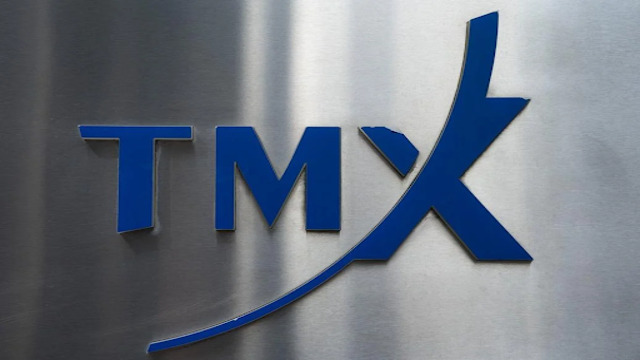
The TMX logo is displayed in Toronto on Wednesday, September 11, 2024. (Photo by Paige Taylor White/The Canadian Press)
Toronto – The Canadian dollar slipped below 70 cents US during late-morning trading on Tuesday, following the latest inflation data from Statistics Canada. The loonie traded at 69.84 cents US, a notable drop from Monday’s 70.23 cents US. This came after November’s inflation rate dipped to 1.9%, down slightly from 2.0% in October, signalling a continued slowdown in price growth.
The decline in the loonie coincided with losses in Canada’s main stock market. The S&P/TSX composite index fell by 72.91 points, landing at 25,074.30. Lower inflation can often suggest a cooling economy, and investors appeared to react cautiously to the news, pulling back on equities.
Across the border, U.S. markets faced similar setbacks. The Dow Jones Industrial Average fell sharply, dropping 270.41 points to 43,447.07. The S&P 500 index lost 22.08 points to close at 6,052, while the tech-heavy Nasdaq composite declined by 70.95 points, ending the session at 20,102.94.
Commodities were also caught in the market downturn, with crude oil and natural gas prices taking significant hits. February’s crude oil contract fell $1.25, trading at $69.04 per barrel. Meanwhile, the January natural gas contract dipped eight cents to settle at $3.14 per mmBTU.
Precious metals and industrial materials also faced declines. February gold contracts dropped $16, bringing gold to $2,654 an ounce, while March copper contracts fell five cents, trading at $4.14 per pound. These commodity price drops further illustrate the ripple effects of a slowing economy and hesitant investor sentiment.
What’s Driving the Decline?
The lower inflation rate, while often seen as positive for consumers, has sparked concerns among investors. A dip below the Bank of Canada’s 2% inflation target may indicate an economic slowdown, leading to weaker consumer spending and reduced business activity. The loonie’s fall reflects these concerns, as a weaker currency often accompanies periods of economic uncertainty.
Additionally, declining oil prices are a key factor impacting Canada’s resource-driven economy. As one of the world’s largest oil exporters, the country’s economic health is closely tied to energy markets. Falling crude prices can hurt corporate revenues and government budgets, adding to broader economic worries.
Global Impacts and Investor Sentiment
The losses in Canadian and U.S. markets suggest investors are adjusting their portfolios in response to mixed economic signals. While slowing inflation could ease the pressure on central banks to raise interest rates further, it may also point to weakening growth. For Canada, a softer loonie and declining commodity prices complicate the economic outlook, creating a challenging environment for businesses and consumers alike.
Tuesday’s market activity serves as a reminder of the interconnectedness of inflation, currency strength, and investor confidence. As 2024 nears its close, analysts will closely watch for signs of stability or further volatility in the months ahead.















